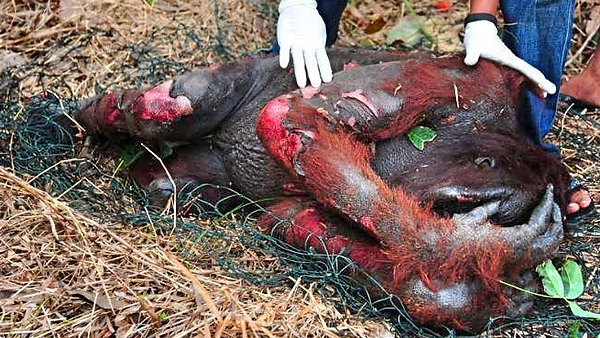THE KIND AWARENESS
What is happening to the Orangutans?

The main threat to the survivial of orangutan populations in the wild is the massive expansion of palm oil plantations in Borneo and Sumatra.
Borneo and Sumatra are the large tropical islands where the two endemic species of orangutans are respectively found (pygmaeus in Borneo and abelii in Sumatra). Sumatra is exclusively Indonesian while Borneo is divided among three nations, Malaysia (Sabah and Sarawak), Brunei, and Indonesia. Permanent wild orangutan populations are only found in Sabah, Sarawak, and Indonesian Borneo (Kalimantan). There are no permanent orangutan populations in Brunei.
Palm oil is the most widely used vegtable oil in the world, having even surpassed soya in terms of usage. Surging global demand for palm oil has fueled massive forest destruction throughout Indonesia and Malaysia, countries that together account for 85% of the world’s palm oil production. Palm oil is ubiquitous! Half the packaged food (and other) products found on supermarket shelves now contain palm oil. Palm oil and palm kernal oil are found in all manner of baked goods, such as cookies, bread, and potato chips, as well as in chocolate and milk (where it adds Vitamin A). Palm oil has also replaced coconut as the main cooking oil traditionally used in Indonesia as well as replacing peanut oil in Myanmar. Palm oil is also extensively used in cosmetics and toiletries where it adds creaminess and/or foam to the product. Palm oil is an important ingredient in the manufacture of soaps, shampoos, detergents, and toothpaste. Increasingly, palm oil is used as a biofuel.
Oil palms only grow in the tropics and need much water. Originally native to South America and West Africa, palm oil plantations have now spread throughout the wet tropics to Papua New Guinea, parts of Asia, Kenya, and also back to countries in West Africa and South America where the palms are native. The problem with palm oil is that vast areas of virgin tropical rain forest are clear cut to open up land for cultivation. Palm oil is a huge industry. Palm oil accounts for 11% of Indonesia’s export earnings and is the most valuable agricultural export. Overall, it is Indonesia’s third largest export earner.
The recent expansion of vast monocrop oil palm plantations in Asia, the Neotropics, and Africa threatens large areas of tropical rain forests. The two most affected countries in this expansion are Indonesia and Malaysia, home of the imperiled orangutans. The United Nations Environment Programme (UNEP) indicated in 2007 that oil palm plantations are the leading cause of rainforest destruction in Malaysia and Indonesia. Another study by Princeton and a Swiss institution reported that between 1990 and 2005, up to 60% of palm oil expansion occurred at the expense of primary tropical rain forest. The establishment of palm oil plantations has been a disaster not only for endangered wildlife such as orangutans and tigers (in Sumatra) but also has excacerbated conflict with local communities in Indonesia over traditional land rights. Local people have been evicted from their customary land holdings and local communities impoverished, leading to much conflict with palm oil concession companies.
In Sumatra at least 10.8 million hectares have been opened up for palm oil plantations. The situation in Borneo is similar. Large scale conversion of tropical rain forests has had an absolutely devastating impact on biodiversity in both Borneo and Sumatra. In addition, deforestation may cause soil erosion and, because most forests have been cleared through the use of fire, massive air pollution from smoke. Much of the land on which palm oil plantations have been established consists of peat swamp forest. The draining, burning, and conversion of peat swamp forests to palm oil has been especially damaging to the world’s climate as it has led to Indonesia being the third largest contributor of carbon to the world’s atmosphere after China and the United States.
Palm oil companies prefer to clear primary forests, rather than degraded areas or grasslands, for economic reasons. They don’t need to utilize or add as much chemical fertilizer (which is expensive) to forest land cleared by fire and fertilized from ash produced by the fire. In addition, the cost of clearing peat swamp forests is subsidised by the sale of commercially valuable timber taken from concession areas as part of the conversion process. After palm oil plantations are established, displaced starving orangutans are frequently killed in the most brutal ways as agricultural pests when they try to obtain food in the plantation areas.


Almost 100% of orangutans that captured by plantation workers are suffering serious wound in the head and hands. They use wooden stick or soil hoe to beat the orangutan's head. Many of them died from this crime. We have spotted this male orangutan in the street, begging for food as the forest gone for development of new oil palm plantation In East Kalimantan.
猩猩发生了什么事?
对野生猩猩种群生存的主要威胁是婆罗洲和苏门答腊棕榈油种植园的大规模扩张。 婆罗洲和苏门答腊岛是大型热带岛屿,分别发现了两种猩猩特有种(婆罗洲的猿猴和苏门答腊的阿贝尔)。苏门答腊是独家印度尼西亚人,而婆罗洲分为三个国家,马来西亚(沙巴和砂拉越),文莱和印度尼西亚。永久性野生猩猩种群仅在沙巴,砂拉越和印度尼西亚婆罗洲(加里曼丹)发现。文莱没有永久的猩猩种群。 棕榈油是世界上使用最广泛的可口油,在使用方面甚至超过了大豆。全球对棕榈油需求量的飙升助长了印度尼西亚和马来西亚的大量森林破坏,这些国家共占全球棕榈油产量的85%。棕榈油无处不在!现在在超市货架上发现的包装食品(和其他)产品的一半现在含有棕榈油。棕榈油和棕榈仁油有各种烘焙食品,如饼干,面包和薯片,以及巧克力和牛奶(添加维生素A的地方)。棕榈油也取代了椰子,成为印度尼西亚传统使用的主要食用油,也取代了缅甸的花生油。棕榈油还被广泛用于化妆品和化妆品中,它为产品添加了奶油和/或泡沫。棕榈油是制造肥皂,香波,洗涤剂和牙膏的重要成分。棕榈油越来越多地被用作生物燃料。
油棕仅在热带地区生长,需要大量的水。原产于南美洲和西非的棕榈油种植园现在已经遍布热带地区到巴布亚新几内亚,亚洲的部分地区,肯尼亚,还有回到西非和南美洲棕榈树原产地的国家。棕榈油的问题是原始热带雨林的大片地区被砍伐开辟耕地。棕榈油是一个巨大的行业。棕榈油占印尼出口收入的11%,是最有价值的农产品出口。总的来说,这是印度尼西亚第三大出口收入来源。
亚洲巨大的单一油棕榈种植园,Neotropics和非洲近来的扩张威胁着大片的热带雨林。印度尼西亚和马来西亚是这个扩张受影响最严重的两个国家。联合国环境规划署(环境规划署)在2007年指出,棕榈油种植园是马来西亚和印度尼西亚热带雨林破坏的主要原因。普林斯顿和一家瑞士机构的另一项研究报告指出,1990年至2005年间,高达60%的棕榈油扩张是以牺牲原生热带雨林为代价的。棕榈油种植园的建立不仅是对猩猩和老虎等濒危野生动物(苏门答腊)的灾难,而且还与印度尼西亚当地社区在传统土地权利方面的冲突加剧。当地人已经被赶出习惯性土地和当地社区,导致与棕榈油特许公司发生冲突。
在苏门答腊,棕榈油种植园至少已经开放了1080万公顷。婆罗洲的情况是相似的。热带雨林的大规模转变对婆罗洲和苏门答腊岛的生物多样性造成了严重的破坏性影响。另外,砍伐森林可能会造成水土流失,因为大部分森林已经通过火灾清除,大量的烟雾造成空气污染。棕榈油种植园所在的大部分土地都是泥炭沼泽森林。泥炭沼泽森林向棕榈油的排放,燃烧和转化对世界气候造成了特别的破坏,使得印度尼西亚成为仅次于中国和美国的第三大碳排放国。
由于经济原因,棕榈油公司宁愿清除原始森林,而不是退化的地区或草原。他们不需要利用或添加尽可能多的化学肥料(这是昂贵的)到林火清除的火灾和火灾产生的灰分受精。此外,清理泥炭沼泽森林的成本由转让过程中出售从特许区域获得的具有商业价值的木材提供补贴。在建立棕榈油种植园之后,流离失所的饥饿的猩猩常常在种植园里尝试获取食物时,以最为野蛮的方式作为农业害虫被杀害。
种植园工作人员捕获的几乎100%的猩猩头部和手部受到严重伤害。他们用木棍或土锄击打猩猩的头。他们中的许多人死于这一罪行。我们在街上发现了这只雄性猩猩,为东加里曼丹的新油棕榈种植园的开发寻求食物。